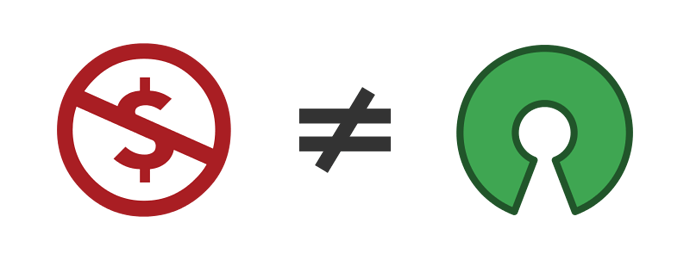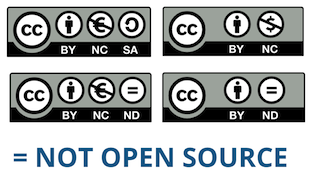The Creative Commons CC-BY-NC, CC-BY-NC-SA, and CC-BY-NC-ND licenses retain a commercial monopoly on a project or product. They do not meet the terms of the Open Definition, Open Hardware Definition, Free Culture Definition, the Free Software or Open Source definition, and cannot be called ‘open source’.
Hackable, transparent, educational, maker-friendly, free-to-download, sure.
‘Inspired by the open source movement’, maybe.
Open source? Absolutely not.
The NC licenses are problematic for a variety of other reasons. One of these is the incompatibility between NC licenses and true open source licenses - if, for example, you want to incorporate content from Wikipedia in your project, you would be infringing upon Wikipedia’s CC-BY-SA license.
Similarly, if you develop a fantastic resource as part of your project and somebody else improves it, develops it for a different format or use, and wants to then contribute it to an existing open source project, it’s impossible - by choosing an NC license you make your work completely incompatible with the commons.
‘Non-Commercial’ is also an extremely vague term which has unfortunate effects. For example, in 2014 the non-profit German public broadcaster Deutschlandradio was successfully sued for using an NC photo on its website, as the court interpreted NC as ‘purely private use’.
Due to this danger, many non-profits, community and commons organisations avoid re-using NC material, further limiting the spread of your work and the opportunities for publicity and improvement this can lead to.
I often send some of the above information to people when I see them using NC licenses and calling their projects ‘open source’, and then I usually explain what to do about it:
##Calling something open source - when it is not - does harm in two ways:
First, it confuses the issue, and makes it less clear to people what open source means, and how it works.
Second, it borrows credibility and deserved kudos from those people and projects who have in fact open sourced their work, and are giving people the freedom to study, understand, modify and sell their products or derivatives thereof.
So in order to avoid misleading people or continuing to falsely claim something which you are not in fact offering, you will need to either:
a) change the license to one compatible with the various Open Definitions, which have been developed and agreed upon by democratic, community-led processes, and reflect the views of the users and creators of Free/Libre/Open works. (CC-BY and CC-BY-SA are acceptable under all of these definitions).
or b) stop referring to your project or product as open source. Of course if it involves open source components, by all means mention them specifically, but be clear they are only components and that the project itself, as it is under a proprietary Creative Commons license, is not open source.
As someone who promotes and supports open source in all its forms, I would naturally prefer that you choose a), and if you have concerns about ownership or business strategies etc when allowing commercial use of your work, I’m happy to give suggestions and offer advice as to how you can deal with those concerns and take advantage of the opportunities for community growth and external input which you can only get with truly open source projects.
But whether you choose a) or b), this issue needs to be addressed - I assume that the error comes from a misunderstanding, but it could be seen as dishonest if not dealt with.
I just found one more thing I wrote a while ago to explain the issue:
Why is this a problem?
Think about it in these terms - maybe I have severe allergies to dairy and eggs, or I am vegan. If I go to a restaurant and order a vegan meal, in most western societies there is a broad cultural understanding of what ‘vegan’ means, as well as some community-defined definitions.
Yes, there are various specific forms of veganism, but there is a clear requirement that vegan food does not contain animal products.
If you serve me a burger you advertise as vegan, which in fact contains egg, butter and cheese, it is simply false advertising, and potentially very harmful to me. I could be vegan due to allergies. And you can’t say ‘well, there’s no meat, and the lettuce is vegan!’ as an excuse - the burger isn’t vegan.
Call it what is is. Your burger is vegetarian. That’s fine. But it’s not vegan.
A vegan still appreciates the effort made to avoid meat by vegetarians, and people who cater to vegetarians. Vegetarian is better than meat. But thanks to correct labelling, they know not to eat it themselves.
Now look at it from the open source perspective.
I work on various open source projects, and I’m always on the lookout for other interesting open source projects, tools and resources to help me improve my own work.
If I go to your website to download something you say is open source, there is a broad cultural understanding of what ‘open source’ means, as well as some community-defined definitions.
Yes, there are various specific forms of open source, but there is a clear requirement that anyone can study, modify, improve and sell the work, or derivatives based on that work.
If your ‘open source’ project or product is under a Non-Commercial license, it is simply false advertising, and potentially very harmful to me. I could be sued for infringing your copyright. And you can’t say ‘well, one software library is open source’ as an excuse - the project as a whole isn’t open source.
Call it what is is. Your project is hackable, adaptable, educational and free-to-download. That’s fine. But it’s not open source.
Of course, I still appreciate that it isn’t ‘All Rights Reserved’, and that you’ve made an effort to give people more transparency and flexibility with your project. Great! But thanks to correct labelling, I know that it isn’t open source, that it’s incompatible with open source projects, and I will know not to use it myself.
Normally copyright for content on community.oscedays.org is assigned to the person who wrote the post, and licensed CC-BY-SA to allow others to use and improve it. This post, however, is in the public domain, free of all copyright restrictions (CC0) so that you can copy/paste parts or all of it into messages and posts to raise awareness of this issue, without needing to attribute me as the author or license your own text accordingly.




